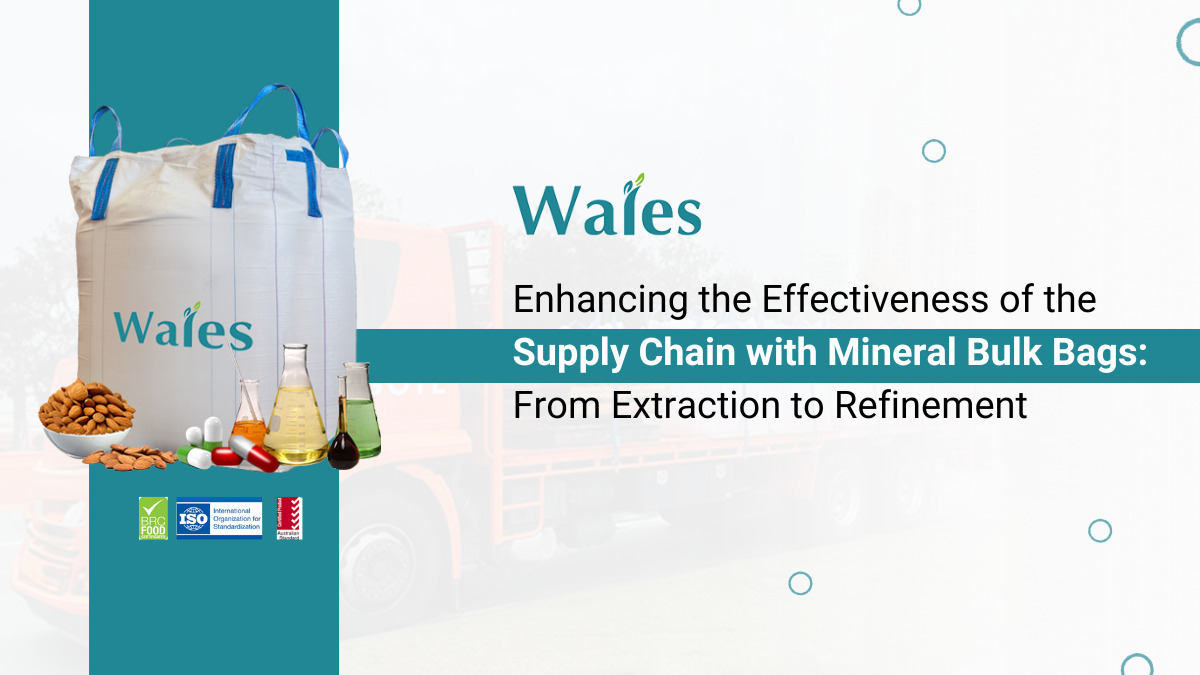
From mining to processing and even in distribution, the mining industry and those allied to it depend on effective and safe storage and transport. However, with the changing trends of increasing demand and diminishing returns, players in the industry are looking for more affordable, efficient, and greenways to improve the operations of the supply chain. This is where mineral bulk bags come along. Such bags, which are commonly referred to as Flexible Intermediate Bulk Containers, or simply FIBCs, have redefined the storage, transportation, and processing of minerals thanks to their flexibility, strength, and effectiveness.
In this detailed article, we will look at addressing the role of mineral bulk bags in the supply chain from the start of the extraction process to the end of the refinement process to provide solutions to modern problems respectively in an orderly manner.
Mineral bulk bags, commonly known as FIBCs, are big flexible containers made of woven polypropylene fabric. Mostly, they are used for carrying a variety of products from raw or processed minerals to dangerous goods. Bulk bags rest on the floor with the help of fill materials and can carry up to two thousand kilograms (or more) of contents, which is thus suitable for the storage and transportation of several materials.
Mineral bulk bags are fast gaining popularity in the handling of minerals because of their adaptability, long-lasting nature, and safety in cost. They provide several advantages in comparison to the usual storage and transport formats, for instance, drums or rigid containers.
Main Benefits:
With their high-stress capacities, woven polypropylene mineral bulk bags can be subjected to extreme conditions of high handling that may be found in surface operations or even inside the bodies of trucks.
Bulk bags hold both dry and wet materials. They come in different sizes and shapes and can be used for different minerals throughout the supply chain.
Bulk bags can be stored by stacking them one over the other, thus saving a lot of warehouse or storeroom space. Also, when these bags are kept empty, there is not much space used as they can be folded and kept in small areas.
In the case of handling bulk quantities of minerals by any organization, especially in hard container types, cost-effective bulk bags are the best alternative.
Lined bulk bags, for instance, may need to be fitted with restrictions such as anti-static and moisture barriers for particular types of minerals.
Extraction Stage: Mineral Bulk Bags Efficient Handling And Transportation
During the extraction stage of operations, there are several types of minerals like coal, iron ore, copper limestone, etc, which need to be moved from the mining area to places where processing occurs. This step of the supply chain is most effectively done with the use of bulk bags which lessens manual work and also enhances loading/unloading.
Once the minerals are excavated from the deposit, the minerals are subjected to several purification processes in readiness for the actual use. The stage is characterized by an emphasis on storage and distribution management in a way that the quality of the finished products remains intact. This stage is well suited for mineral bulk bags which provide systematic and cheap means of storage for processed minerals.
The global industry is becoming more focused on sustainable practices and policies for the mineral extraction and purification processes. Bulk bags for minerals represent a more eco-friendly packaging solution than the conventional methods.
Most of the bulk bags come in a variety of designs and can be reused working towards the campaign of minimizing waste. The use of bulk bags reduces packaging waste and the need for more packing materials such as plastic or metal drums.
Transporting the finished product is one of the main concerns of a minerals company, since the transportation of valuable or dangerous goods, in particular, is concerned with most risk. Safe and long-distance transportation of mineral bulk bags is assured by the security features incorporated in the design of the bags.
Mineral bulk bags can be modified to cater to different industries and different reasons bulk bags are therefore vivacious to most storage means and modes.
Mineral bulk bags have changed the concept of mineral extraction, storage, transportation, and even processing. They are very flexible and durable and are also cheaper making them superior compared to the conventional methods of storage and transportation. The reduction of the environmental impact, and the safe transport of precious and/or dangerous goods, especially in the mineral industry can be improved by the application of bulk bags.
Bulk bags, serving to enclose bulk solids, are at present fitted into the entire production process of every industry in which they are utilized – from the extraction of raw minerals to the refinement and distribution of processed products. The high-quality bulk bags can afford better efficiency and more importantly, a future-proof and safer supply chain.
Wales Industries is the leader in the bulk bag manufacturing industry and offers customized bulk bag solutions that allow minerals to be handled safely and at every stage of the supply chain within this industry.